The History Undergraduate and Masters program sponsors an annual speakers series providing an opportunity for our students to hear and meet some of the most exciting and innovative scholars in the humanities. There are opportunities to socialize with our visitors afterwards. As always, these presentations are open to all members of the university community.
2024-2025
Max Eisen Lecture in Holocaust Studies
Join speaker Dr. Peter Suedfeld as he discusses two families, joined in marriage, who lived as ordinary Hungarian citizens for several centuries. Their accustomed way of life changed drastically when in the 1940s the Holocaust focused on the Jews of Hungary. Over the next few years, they lost all rights, possessions, and protection from the state. Eventually, all younger men became slave labourers for the army; other family members were deported to concentration camps, mostly to Auschwitz, where many were murdered; and most of the rest were crammed into the ghetto. Peter, the sole child in both families, was hidden in an orphanage. The talk describes the diverse nature of their experiences and of how the survivors rebuilt their lives, with new homes, new work, and in some cases new families. Location: Market Hall Performing Arts Centre (140 Charlotte Street, Peterborough)
2022-2023
Spanish Civil War Virtual Museum
https://www.theguardian.com/world/2022/oct/10/virtual-spanish-civil-war-...
2020-2021
Elora Passafiume 3rd year Trent History Student published an article based on a project in HIST 4050Y.
For the issue: https://indd.adobe.com/view/f497de61-43bb-4700-9aa4-7bc5e0a8caff
("Spring 2021" issue)
2019-20 Academic Year

Dr. Stephen Bocking
Cold Science: The Cold War and the Canadian Arctic
Tuesday, November 12, 2019 at 6:30PM in Bagnani Hall, Traill College
Presented by the Historical Visions and Revisions Speakers Series
We usually think of the Cold War in strategic terms: as a confrontation between the United States and the Soviet Union, remembered through emblematic events such as the Cuban Missile Crisis in 1962 and the puncturing of the Berlin Wall in 1989. But the Cold War extended across the planet, and shaped not just military affairs, but political, environmental, and scientific ideas. This was especially evident in the Arctic. Now positioned on the front line of the standoff between the superpowers, this region became both a militarized zone and the focus of intensive scientific research. The perspectives that formed during this time continue to shape our understanding of the Arctic today, including awareness of its vulnerability to global climate change.
Stephen Bocking is a professor of environmental history and policy in the Trent School of the Environment. He teaches courses about the relationship between science and politics, international environmental issues, and environmental history. In his research he is especially interested in the roles of knowledge in environmental affairs, both historically and today.
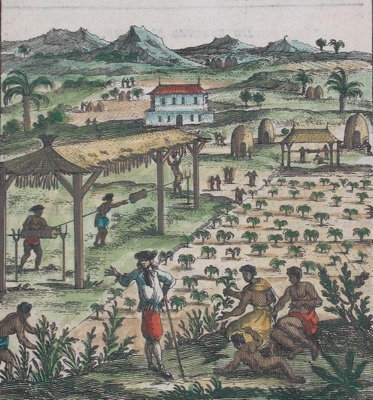 Dr. Vicente Sanz Rozalén
Dr. Vicente Sanz Rozalén
Tobacco: A Social History of Iberian Colonial Rule
Monday, October 7, 2019 at 6:00PM in Bagnani Hall, Traill College
Presented by the Historical Visions and Revisions Speakers Series
Tobacco was originally from the Americas. For the first Iberian conquerors, that plant/crop marked a contradictory problem. For some, it represented the diabolical and a sin. Others saw tobacco as a medicine, as did many first peoples. But from the fifteenth century forward, the Spanish Crowns saw it primarily as an opportunity to earn income through taxation as a royal monopoly. The importance of the tobacco monopoly was always at the core of how the Spanish Crowns shaped colonial policy. In 1762, tobacco financed key reforms that came to sustain the Spanish empire in both the Americas and in Asia.
Professor Vicent Sanz teaches Modern History at Universitat Jaume I (Spain). He is the author of D’artesans a proletaris (1995), and Propiedad y desposesión campesina (2000). He co-edited En el nombre del oficio (2005), A Social History of Spanish Labour (2007), Tabaco e escravos nos impérios ibéricos (2015),with Michael Zeuske a dossier on the microhistory of enslaved peoples in Millars. Espai i Història (2017), and Resistencia, delito y dominación en el mundo esclavo (2018). His work has appeared in Pensamiento caribeño (2007), Trabajo libre y coactivo en sociedades de plantación (2009), Francisco Arango y la invención de la Cuba azucarera (2009), Les fruits de la terre (2013), O sistema atlântico do tabaco iberico (2014), Política y Hacienda del tabaco en los imperios ibéricos (siglos XVII-XIX) (2014), and Esclavitud, mestizaje y abolicionismo en los mundos hispánicos (2015). He manages and curates the radio program Hablemos de Historia, which focuses on historical methodologies.
2018-19 Academic Year
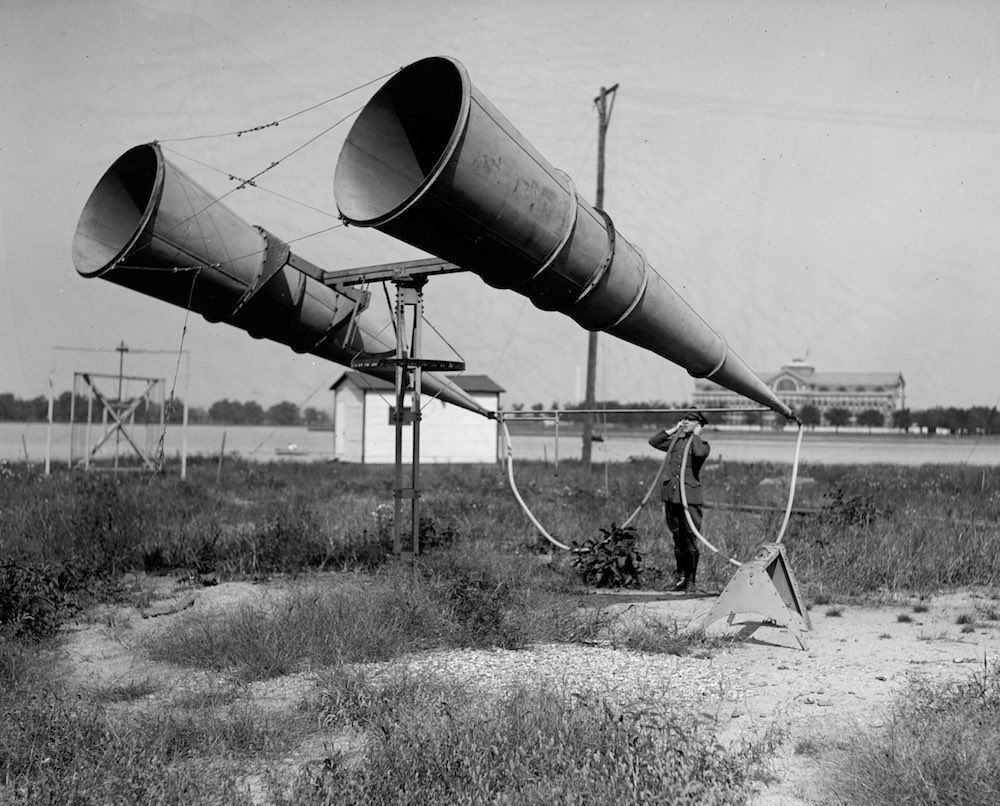 Dr. J. Martin Vest
Dr. J. Martin Vest
Gunfire, Phonographs, Laughter: Sound Studies and the Promise of an Audible Past
February 11, 2019 at 7:30PM in Bagnani Hall, Traill College
Presented by the Historical Visions and Revisions Speakers Series
Historians have long relied on sonic metaphors to make sense of their craft. We comb through sources in search of subjects’ “voices;” we “listen” to texts and hope to “speak” to or “resonate” with audiences in the academy and beyond. Since the early 2000s, however, historians working in the field of sound studies have moved beyond metaphorical “listening” to investigate the sonic past itself. They have detailed past “soundscapes” from the nineteenth century French countryside to the interiors of twentieth century skyscrapers. They have unearthed sounds' historically-situated meanings as well as the technologies and practices historical subjects have used to amplify, transmit, quiet, conceal, and manipulate them. In this talk, J. Martin Vest will detail the emergence of sound studies in the humanities and social sciences, with particular emphasis on its impact within the discipline of history. Drawing on his own work as well as that of leading sound scholars, he will discuss sound studies methodologies as well as some recent findings within the field. He will make a brief for the promise of a sonically-informed history but will also argue that sound studies represents just one manifestation of a broader—and dynamic—transformation within recent historical scholarship.
J. Martin Vest is a lecturer in the University of Michigan, Department of History and holds a masters degree in history from Virginia Commonwealth University and a doctorate in history from the University of Michigan. His current research focuses on the intersections of sound, hearing, technology and American thought and culture, though his past work has touched on a variety of historical subjects, from the intellectual history of anarchism to tropes of insanity in twentieth century popular culture. His dissertation, “Vox Machinae: Phonographs and the Birth of Sonic Modernity, 1877-1930,” detailed the first half-century of the American recording industry, paying particular attention to the complex interrelationships the industry spawned between machines, money and ways of hearing. He is currently at work on a book based on his dissertation.
Holo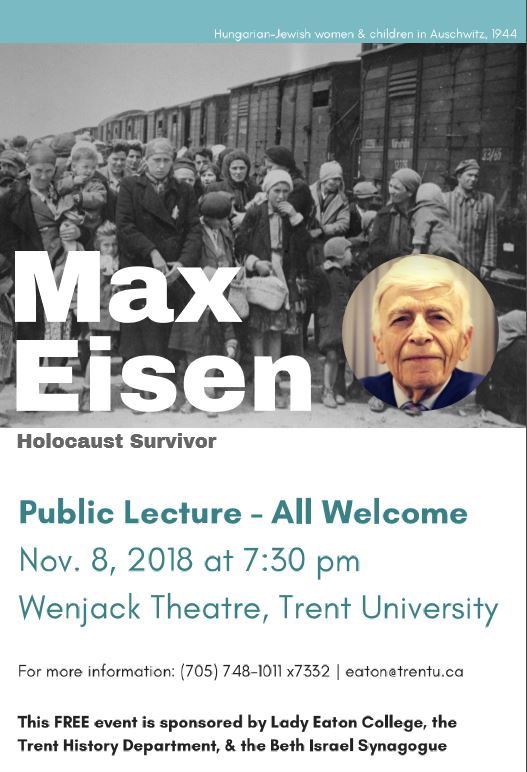 caust survivor Max Eisen speaks at Trent University
caust survivor Max Eisen speaks at Trent University
Holocaust survivor Max Eisen -- a 2018 Trent Honorary Degree recipient and an award-winning author (By Chance Alone) -- will speak about his experiences in Auschwitz and his emigration to Canada in the postwar years. Max has been a key witness in two recent trials in Germany of Holocaust perpetrators; he is also featured in the 2018 documentary The Accountant of Auschwitz (about SS perpetrator Oskar Groening). For over 30 years, he has devoted himself to educating Canadians about the Holocaust; his tireless efforts to tell others about what he saw and suffered through has made him one of Canada's foremost witnesses to genocide. Trent University is grateful to have Max speaking in Peterborough during Holocaust Education Week in Ontario. His talk is sponsored by Lady Eaton College, the Beth-Israel Synagogue, and the History Department at Trent University. All are welcome at this talk and copies of Max's memoir will be available for purchase.
Please join us on Thursday, November 8, 2018 at 7:30 pm in the Wenjack Theatre
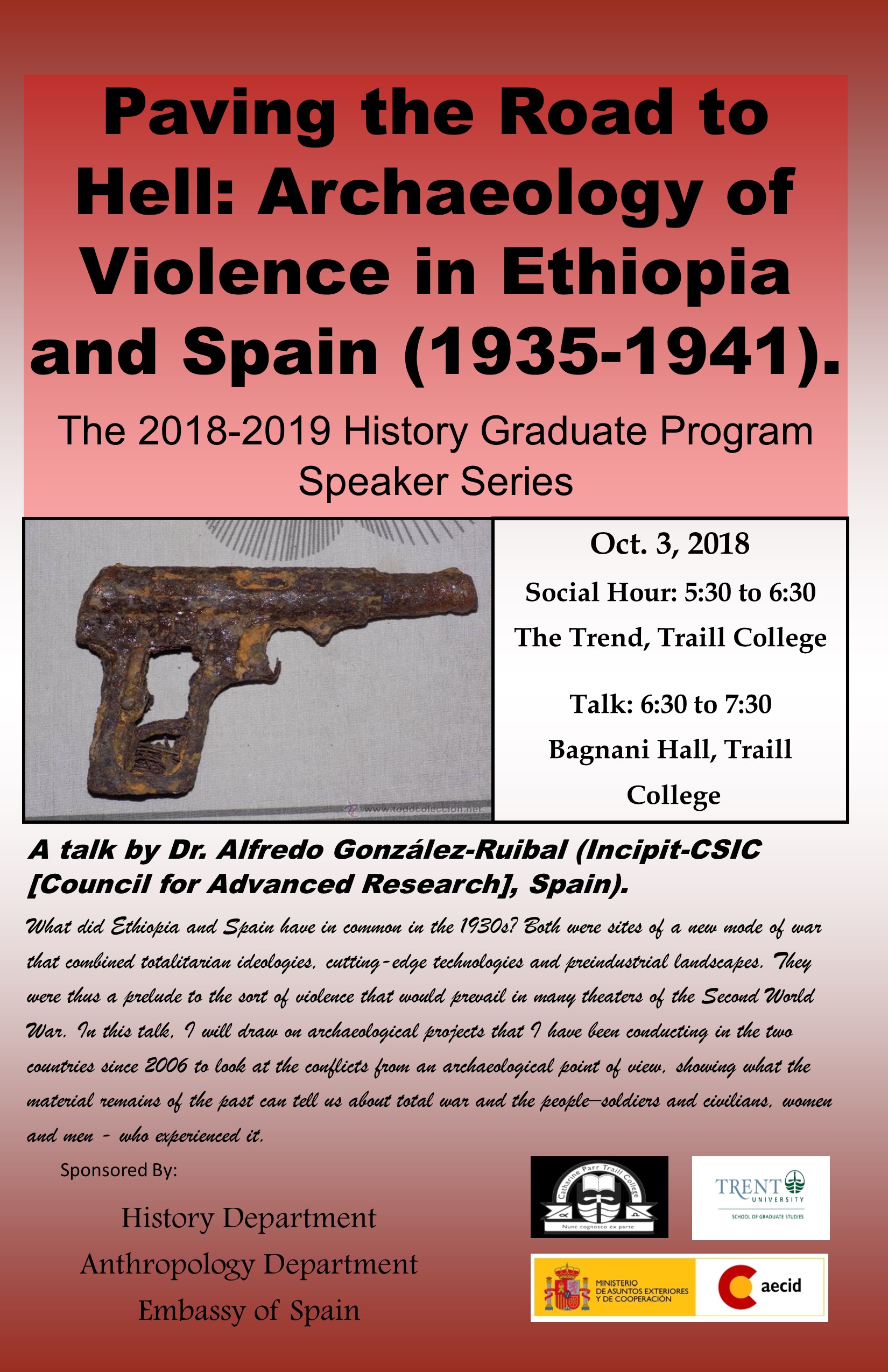 Dr. Alfredo González-Ruibal (Incipit-CSIC [Council for Advanced Research], Spain)
Dr. Alfredo González-Ruibal (Incipit-CSIC [Council for Advanced Research], Spain)
Paving the Road to Hell: Archaeology of Violence in Ethiopia and Spain (1935-1941). The 2018-2019 History Graduate Program Speaker Series
What did Ethiopia and Spain have in common in the 1930s? Both were sites of a new mode of war that combined totalitarian ideologies, cutting-edge technologies and preindustrial landscapes. They were thus a prelude to the sort of violence that would prevail in many theaters of the Second World War. In this talk, I will draw on archaeological projects that I have been conducting in the two countries since 2006 to look at the conflicts from an archaeological point of view, showing what the material remains of the past can tell us about total war and the people–soldiers and civilians, women and men - who experienced it.
Please join us Oct. 3, 2018 Social Hour: 5:30 to 6:30 at The Trend, Traill College
Talk: 6:30 to 7:30 at Bagnani Hall, Traill College
2017-18 Academic Year
Trent History Graduate Students Win Prestigious Scholarships
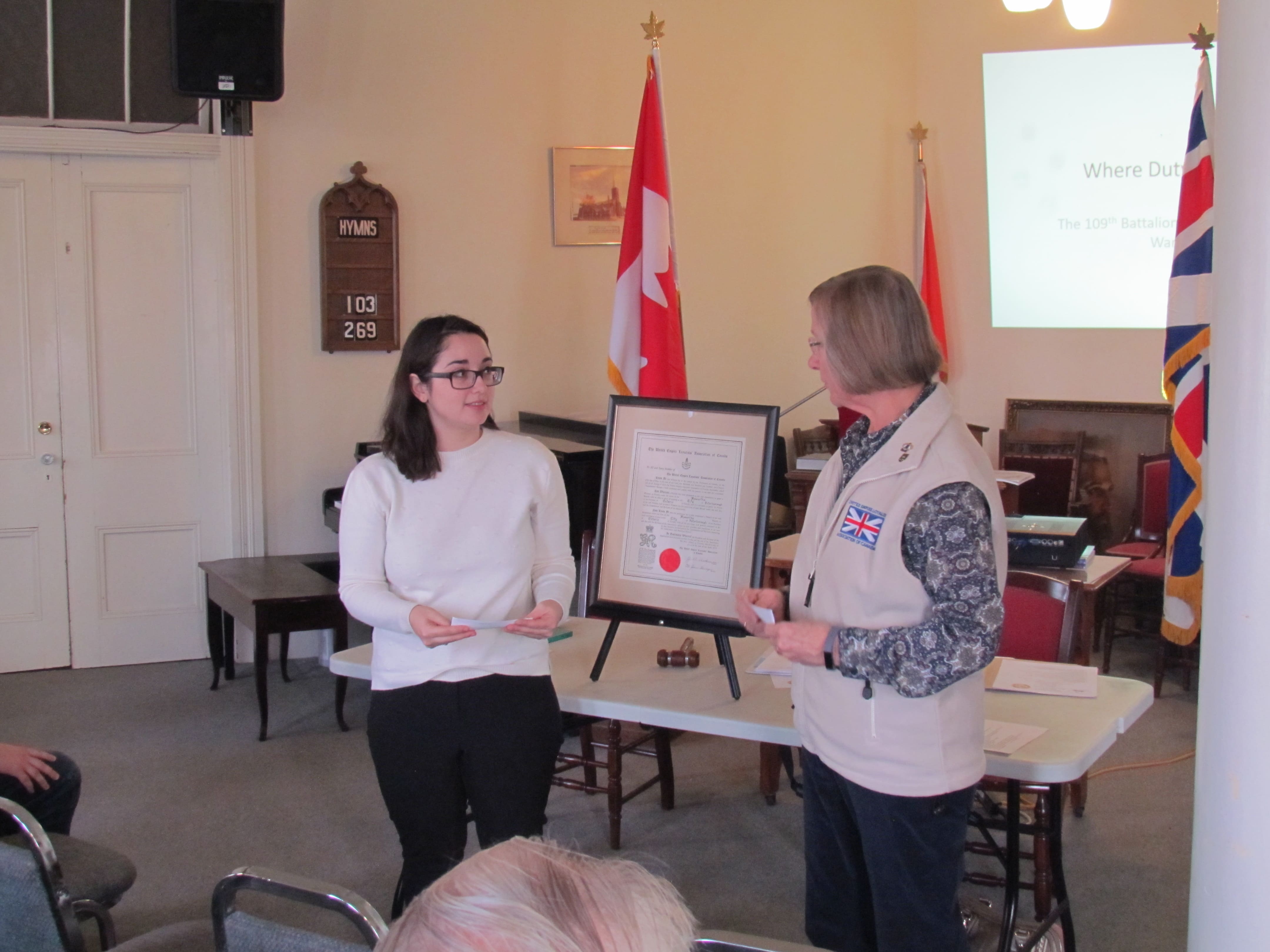 The 2017-2018 Academic Year has been a good one for the Trent History MA program. Two students have won National scholarships from the Social Sciences and Humanities Research Council of Canada (SSHRC). This year also marks the start of an annual scholarship offered by the United Empire Loyalists Association of Canada (UELAC).
The 2017-2018 Academic Year has been a good one for the Trent History MA program. Two students have won National scholarships from the Social Sciences and Humanities Research Council of Canada (SSHRC). This year also marks the start of an annual scholarship offered by the United Empire Loyalists Association of Canada (UELAC).
These awards bring a cumulative total of $37,000 in external scholarships to help fund History graduate research this year, in addition to the generous funding package provided by Trent University.
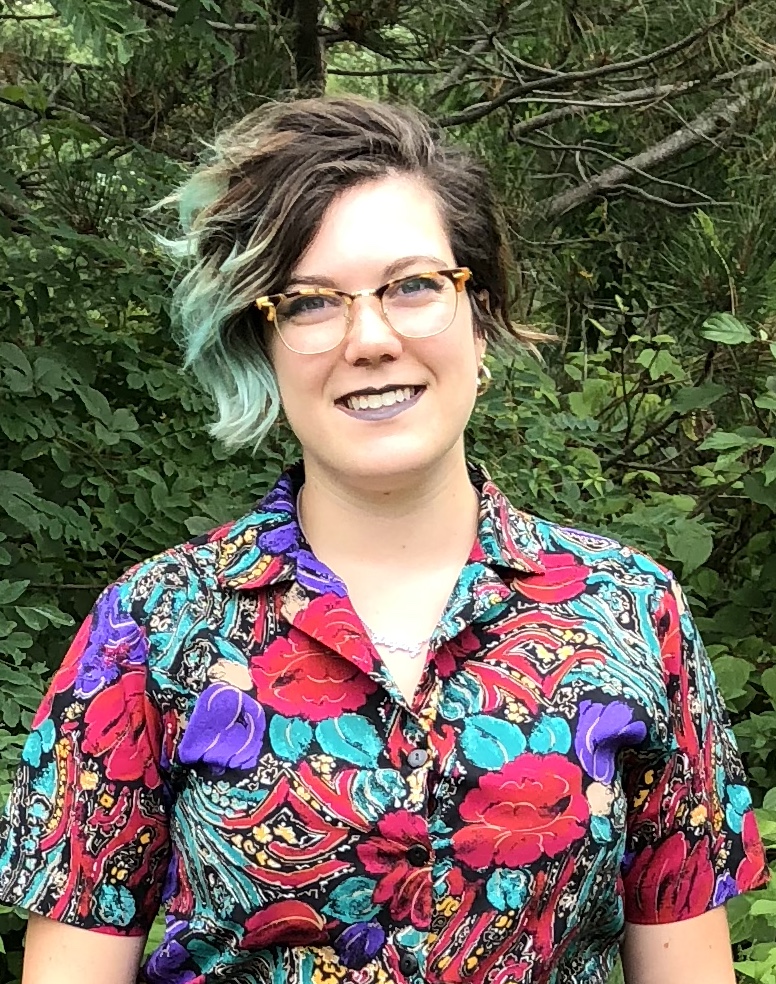
Michelle Arentsen, pictured receiving cheque from UELAC Kawartha Chapter president Grietje McBride, and Melissa Hennig, pictured right, have each won a Joseph-Armand Bombardier Canada Graduate Scholarship, valued at $17,500 for a twelve-month period of study. The scholarships are awarded based on candidates’ record of academic excellence, as well as the quality and potential of their research projects. Both Arentsen and Hennig are working on the history of children in eighteenth-century Britain. Arentsen’s project will explore the behaviour of delinquent children in a London institution run by the Royal Philanthropic society from 1788 to 1825. Hennig’s thesis will examine the way that social reformers in Britain’s commercial classes viewed children in the art, literature, and court reporting of the mid-eighteenth century.
Arentsen has been fortunate in also winning one of two inaugural John Chard Scholarship bursaries from the Kawartha Chapter of the UELAC. Trent History M.A. student Gareth Copeland, pictured below receiving cheque from UELAC Kawartha Chapter president Grietje McBride, won as well for his research project that examines English soldiers’ descriptions of service in Eurasia and the Americas from 1770 to 1820. All of these students are supervised by Professor Jennine Hurl-Eamon.
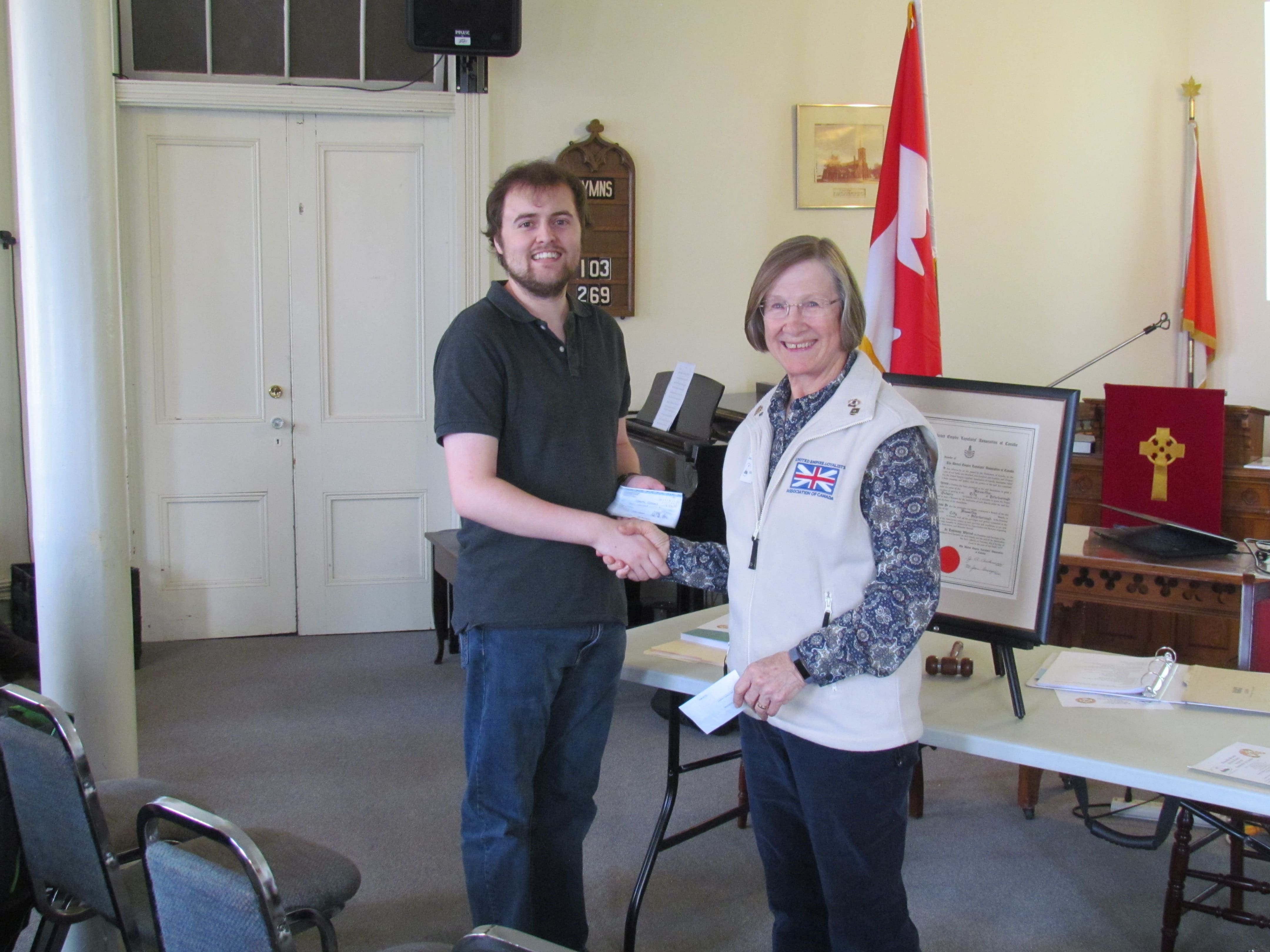
The scholarship is named after former UELAC Dominion President John Chard, whose generous bequest enabled its establishment. From founding new Chapters to publishing the semi-annual newsletter, Chard devoted much of his life to serving UELAC.
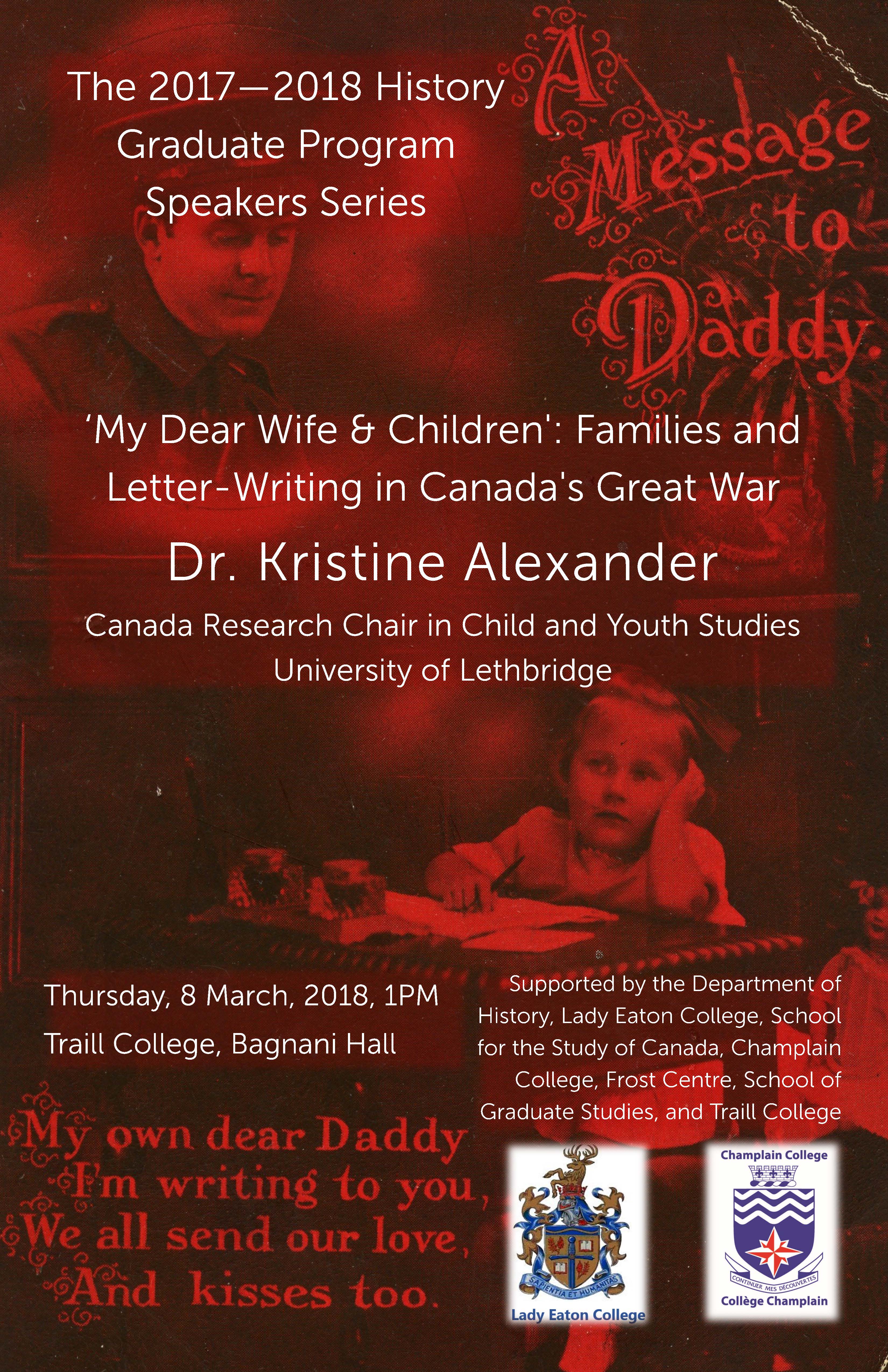 Dr. Kristine Alexander
Dr. Kristine Alexander
Canada Research Chair in Child and Youth Studies, Assistant Professor of History, and Director of the Institute for Child and Youth Studies at the University of Lethbridge
March 8, 2018
'My dear wife & children': Families and Letter-Writing in Canada's Great War
Presented by the Historical Visions and Revisions Speakers Series
The First World War was a moment of rupture for Canadian families, as military service separated hundreds of thousands of men from their homes and kin for extended periods of time. On both sides of the home/front divide, soldiers and their loved ones used written correspondence to cope with the emotional and material traumas of total war. Yet despite their obvious importance, the letters exchanged by Canadian soldiers and their kin throughout the Great War remain surprisingly understudied. This talk will reassess the value of wartime letters as sources of information about gender, family, childhood, and the emotions.
Kristine Alexander is Canada research chair in Child and Youth Studies, assistant professor of History, and director of the Institute for Child and Youth Studies at the University of Lethbridge. She is a co-editor of the peer-reviewed journal Jeunesse: Young People, Texts, Cultures, and the author of Guiding Modern Girls: Girlhood, Empire, and Internationalism in the 1920s and 1930s (UBC Press, 2017). Her current book project is a study of Canadian families and letter-writing during the First World War.
This event is open to the community.
In Search of Almighty Voice: Why the Willow Cree Man was the Most Wanted Fugitive in 1890s Canada and His Story
Distinguished Trent alum to explore tragic episode in Indigenous and Canadian history
Please join us in Science Complex 203 on Tuesday, March 6 at 4 pm, as Professor Bill Waiser returns to Trent to give a talk on the Willow Cree man, why he was the most wanted fugitive in Canada in the late 1890s, and how his story and fate have been interpreted since his violent 1897 death at the hands of the North-West Mounted Police.
Professor Waiser, is one of Trent’s most distinguished alumni and the author of more than a dozen books. His A World We Have Lost: Saskatchewan before 1905 won the 2016 Governor General’s literary award for non-fiction. Bill has been appointed to the Order of Canada, awarded the Saskatchewan Order of Merit, elected a fellow of the Royal Society of Canada, named a distinguished university professor, and granted a D.Litt.
This event is being generously support by the Departments of History and Indigenous Studies, the School for the Study of Canada, and the Frost Centre for Canadian and Indigenous Studies.
All are welcome!
For further information, please contact Dimitry Anastakis, Department of History, danastakis@trentu.ca
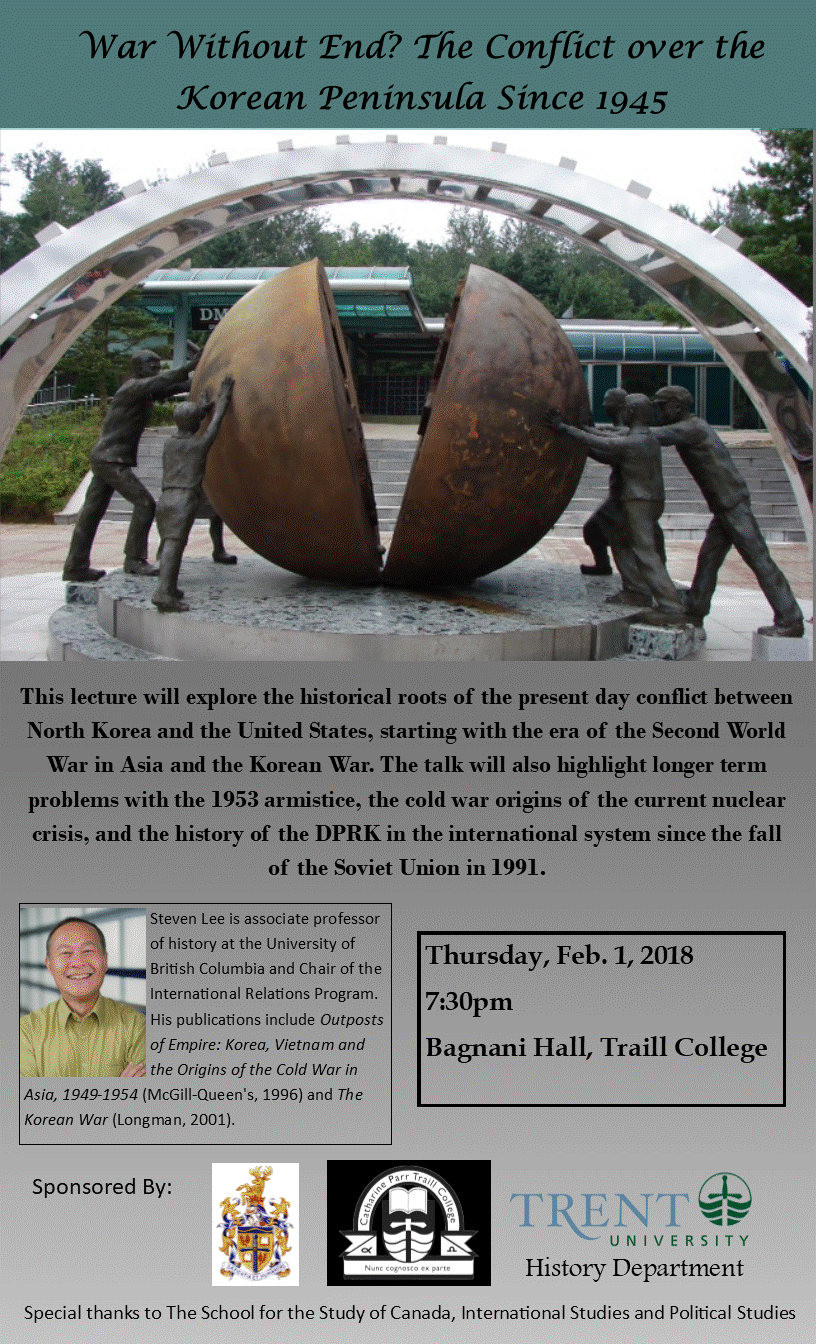 Dr. Steven Lee
Dr. Steven Lee
Associate Professor at the University of British Columbia
As world attention turns to Pyeongchang for the Winter Olympics, tension with North Korea and fear of a nuclear war continue to rise. Going beyond the headlines, the History Department along with Traill and Lady Eaton College present:*
"War Without End? The Conflict over the Korean Peninsula Since 1945"
Thursday Feb 1, 7:30 pm at Bagnani Hall, Traill College.
Guest Speaker Dr. Steven Lee (UBC) will explore the historical roots of the present day conflict between North Korea and the United States, starting with the era of the Second World War in Asia and the Korean War. The talk will also highlight longer term problems with the 1953 armistice, the cold war origins of the current nuclear crisis, and the history of the DPRK in the international system since the fall of the Soviet Union in 1991.
*We acknowledge the support from The School for the Study of Canada, International Studies and Political Studies.
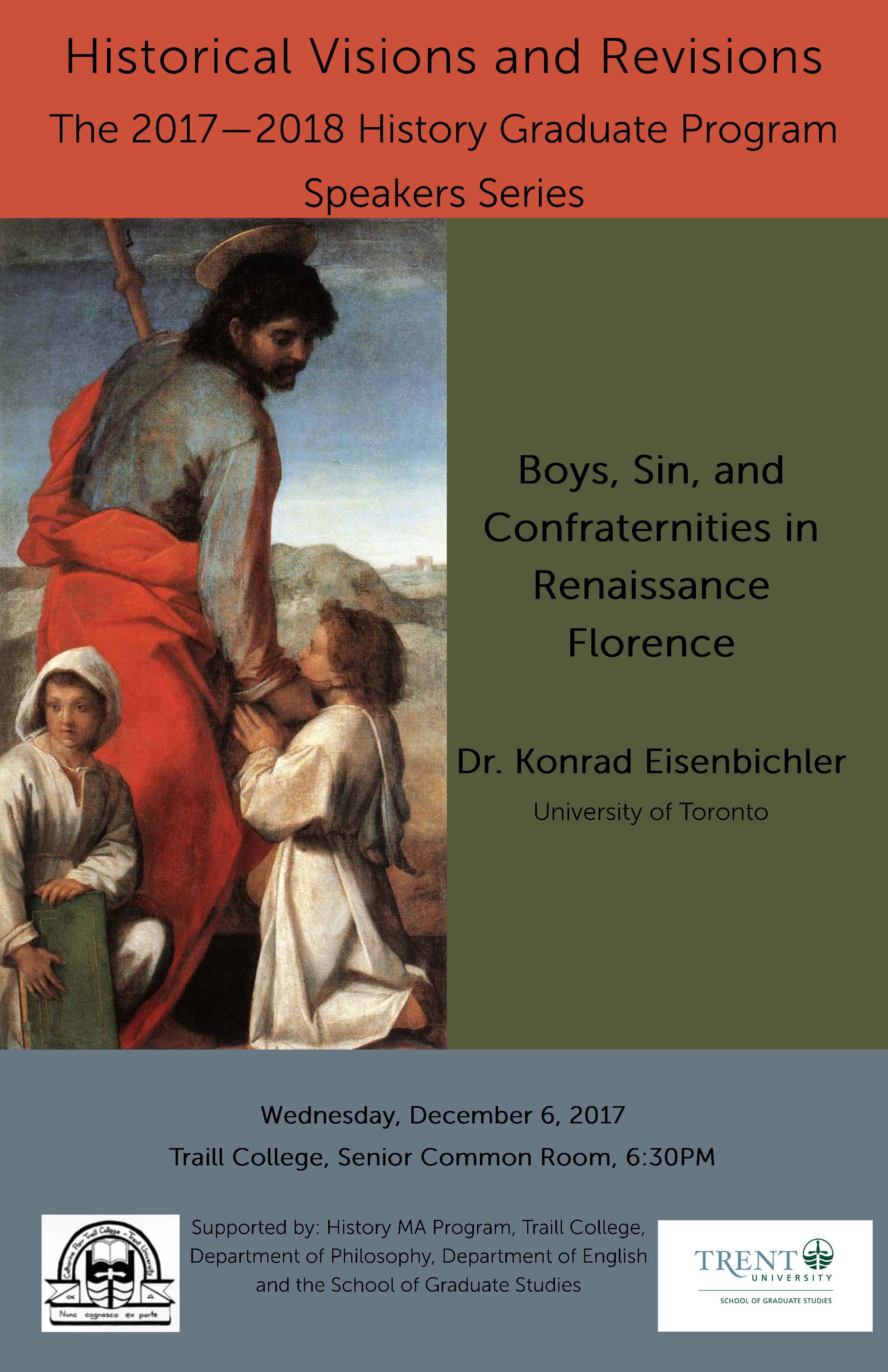 Dr. Konrad Eisenbichler
Dr. Konrad Eisenbichler
Professor, Renaissance Studies Program and the Department of Italian Studies at the University of Toronto
December 6, 2017
Boys, Sin, and Confraternities in Renaissance Florence
Presented by the Historical Visions and Revisions Speakers Series
Florentine confraternities for young men aged 13 to 24 sought not only to gather youths for prayer and devotion, but also to teach them socially acceptable behaviour. Part of this pedagogical effort is evident in the religious plays the youths performed at Carnival time and on other special occasions. Taking the lead from Castellan de' Castellani’s play on the parable of the prodigal son, this presentation will examine Florentine attitudes towards youths, sin, and confraternities as evidenced not only in Castellani's play, but also in Savonarola's work with Florentine youths, and in contemporary records from confraternal and personal documents.
Konrad Eisenbichler teaches in the Renaissance Studies Program and in the Department of Italian Studies at the university of Toronto. His research focuses on the intersection of literature, politics, and religion in fifteenth- and sixteenth-century Italy, with a special interest in how this intersection operates within early modern confraternities. He is the author, translator, or editor of more than 20 books, among which the monograph The Boys of the Archangel Raphael. A Youth Confraternity in Florence, 1411-1785, which received the Howard A. Marraro Prize from the American Catholic Historical Association, and the monograph of The Sword and the Pen: Women, Politics, and Poetry in Sixteenth-Century Siena, which won several prizes, including the Ennio Flaiano International Prize for Italian Studies and the "Outstanding Academic Title for 2013" awarded by Choice magazine. In 2014 he was elected a Fellow of the Royal Society of Canada.
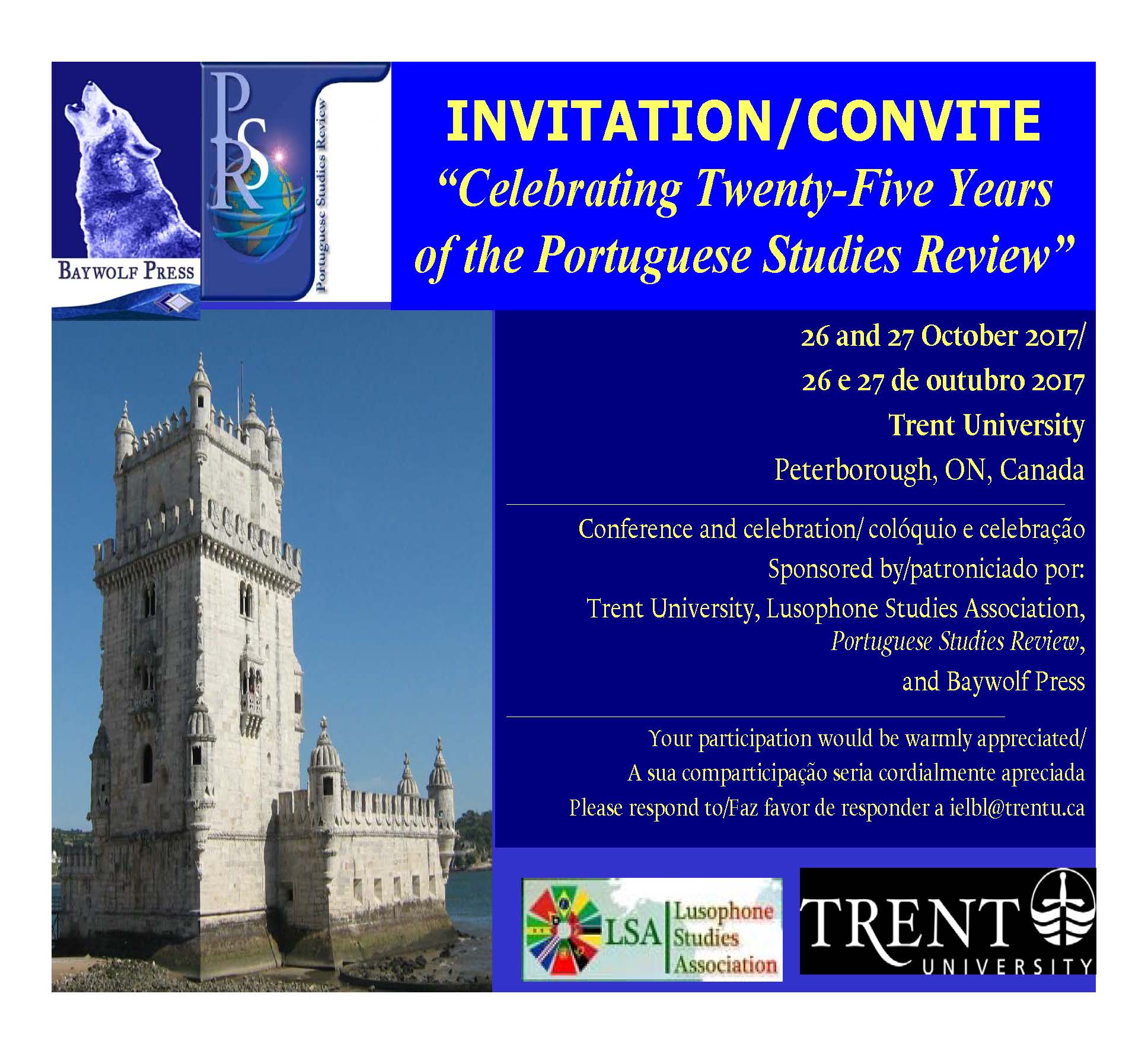
Conference:
“Celebrating Twenty-Years of the Portuguese Studies Review”
October 26 and 27, 2017
Sponsored by/Patroniciado por: Trent University, Lusophone Studies Association, Portuguese Studies Review, and Baywolf Press
2016-17 Academic Year
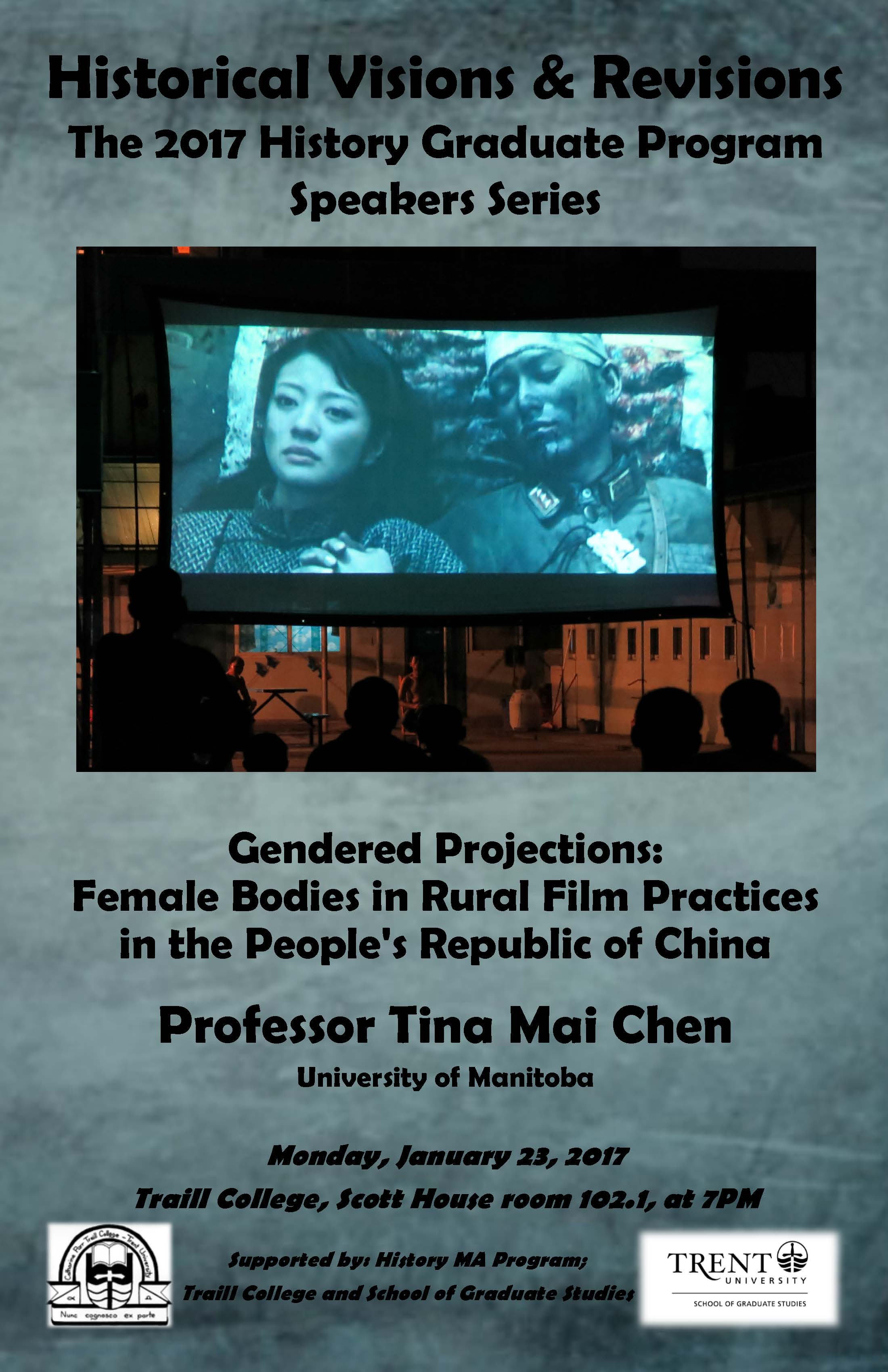 Dr. Tina Mai Chen
Dr. Tina Mai Chen
Professor and head of the Department of History at the University of Manitoba, and co-ordinator, Interdisciplinary Research Circle on Globalization and Cosmopolitanism
January 23, 2017
Presented by the Historical Visions and Revisions Speakers Series
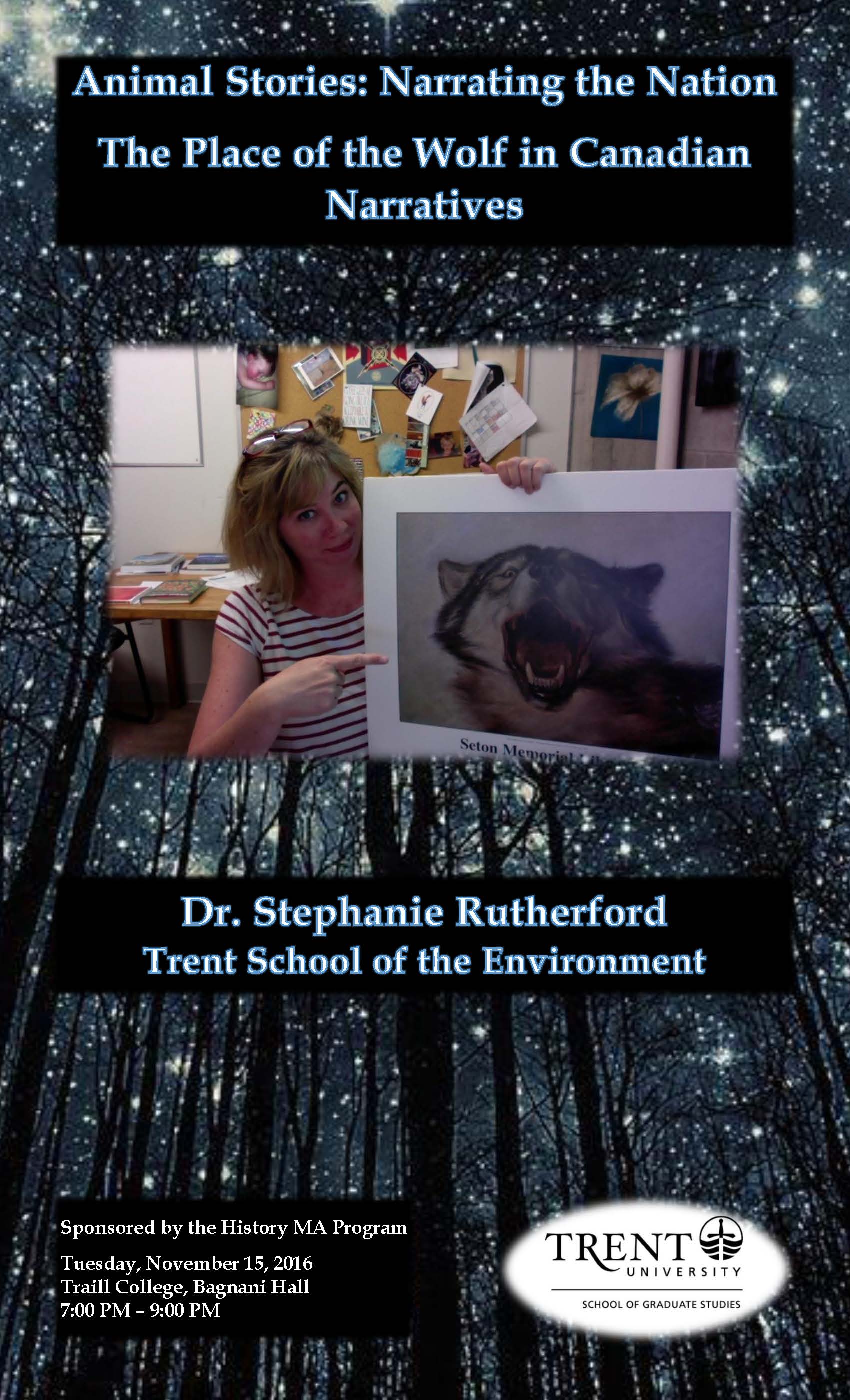 Dr. Stephanie Rutherford
Dr. Stephanie Rutherford
Associate Professor, Environmental and Resource Studies at Trent University
November 15, 2016
Animal Stories: Narrating the Nation The Place of the Wolf in Canadian Narratives
Dr. Stephanie Rutherford, associate professor, Environmental and Resource Studies discusses how animals occupy a complex and sometimes contradictory space in national narratives. Often in settler colonial countries like Canada, struggle with nonhuman nature is venerated as the vehicle through which national identity is born. At the same time, the animals that were so central to the making of Canada – both wild and domesticated – often act as spectral figures at the edges of historical change, erased from the places we might go in search of their pasts. However, the stories we tell about animals, and the ways they support particular ideas about the nation differently at different times, are a valuable archive that shows how narratives of the nation are anything but static. Using the metaphor of migration, this talk suggests that the history of wolves in Canada offers a particularly interesting way to conceptualize the shifting terrain of nationhood.
2015-2016 Academic Year
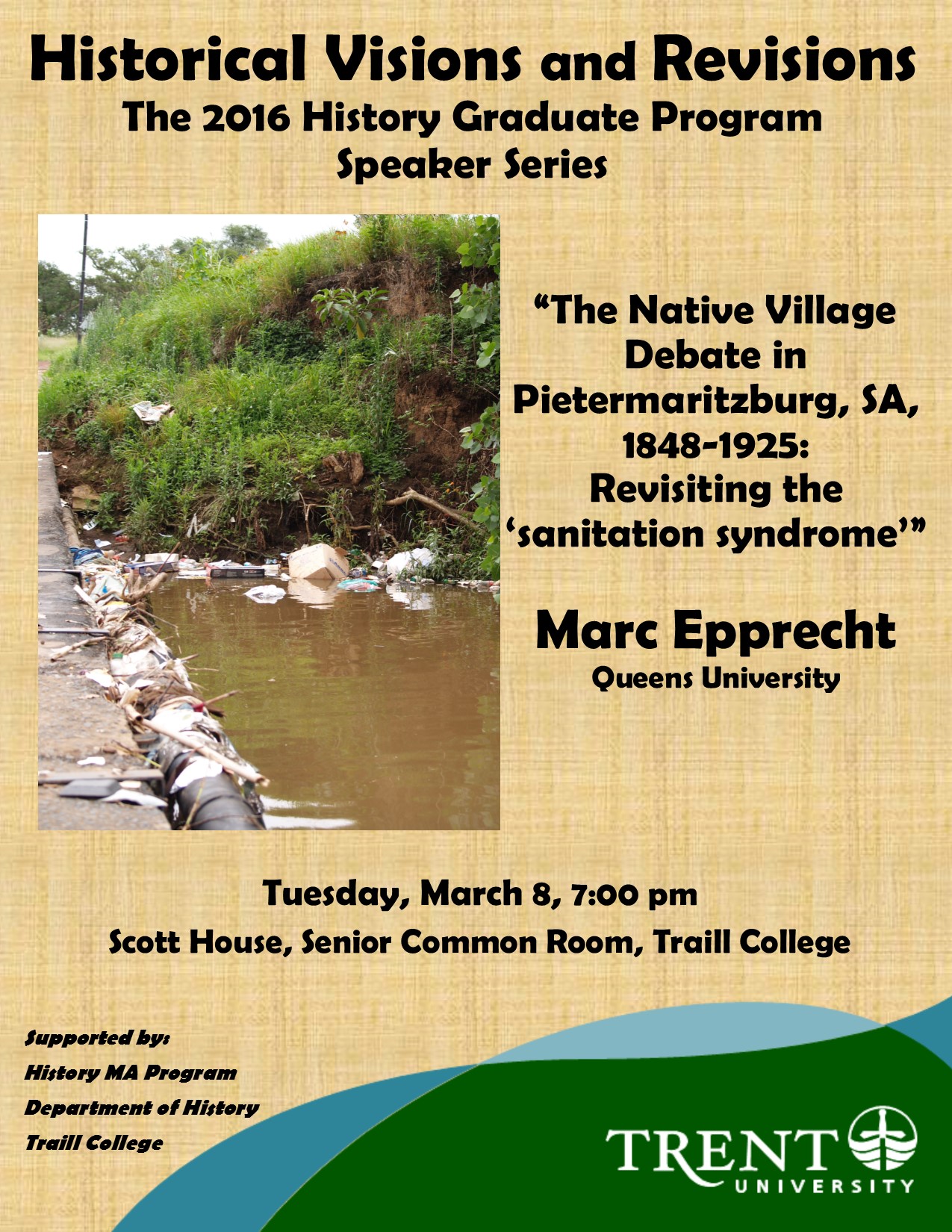 Dr. Marc Epprecht
Dr. Marc Epprecht
Professor and Head of the Department of Global Development Studies at Queen's University
March 8, 2016
The Native Village Debate in Pietermaritzburg, SA, 1848-1925: Revisiting the 'sanitation syndrome'
Presented by the Historical Visions and Revisions Speakers Series
Maynard Swanson first coined the term “sanitation syndrome” in his 1976 study of the origins of racial segregation in Durban. This posits that scientific knowledge about contagious disease was co-opted and exploited by racist whites - sometimes unconsciously - as a rational-sounding, humanitarian cover for the politically difficult goal of physically removing Asians and Africans from the city into tightly controlled, racially segregated locations. The concept struck a chord among radical historians in South Africa and farther afield, not only because it problematized science as metaphorical, but also because it shifted blame for the antecedents of apartheid onto urban, self-styled progressive British officials and voters. I employ a case study approach to assess whether the empirical evidence from Maritzburg supports such an analysis. The focus is upon an infamous decision in 1925 to place the “model native village” beside the city dump. I highlight generally overlooked African voices in that debate, and particularly elite women’s first foray into the public political sphere (1923), long before the usual starting point for African women’s political activism.
Marc Epprecht is a Professor and Head of the Department of Global Development Studies at Queen's University. He has published extensively on the history of gender and sexuality in Africa including Hungochani: The history of a dissident sexuality in southern Africa (winner of the 2006 Joel Gregory Prize – best book on Africa published in Canada), Heterosexual Africa? and Sexuality and Social Justice in Africa. Marc lived on the continent off and on since the 1980s and has also taught at the U. of Zimbabwe, U. of KwaZulu-Natal, and U. of Basel. His forthcoming book is entitled Environment, Health, and Gender in an African City: Edendale and environs, South Africa (MQUP).
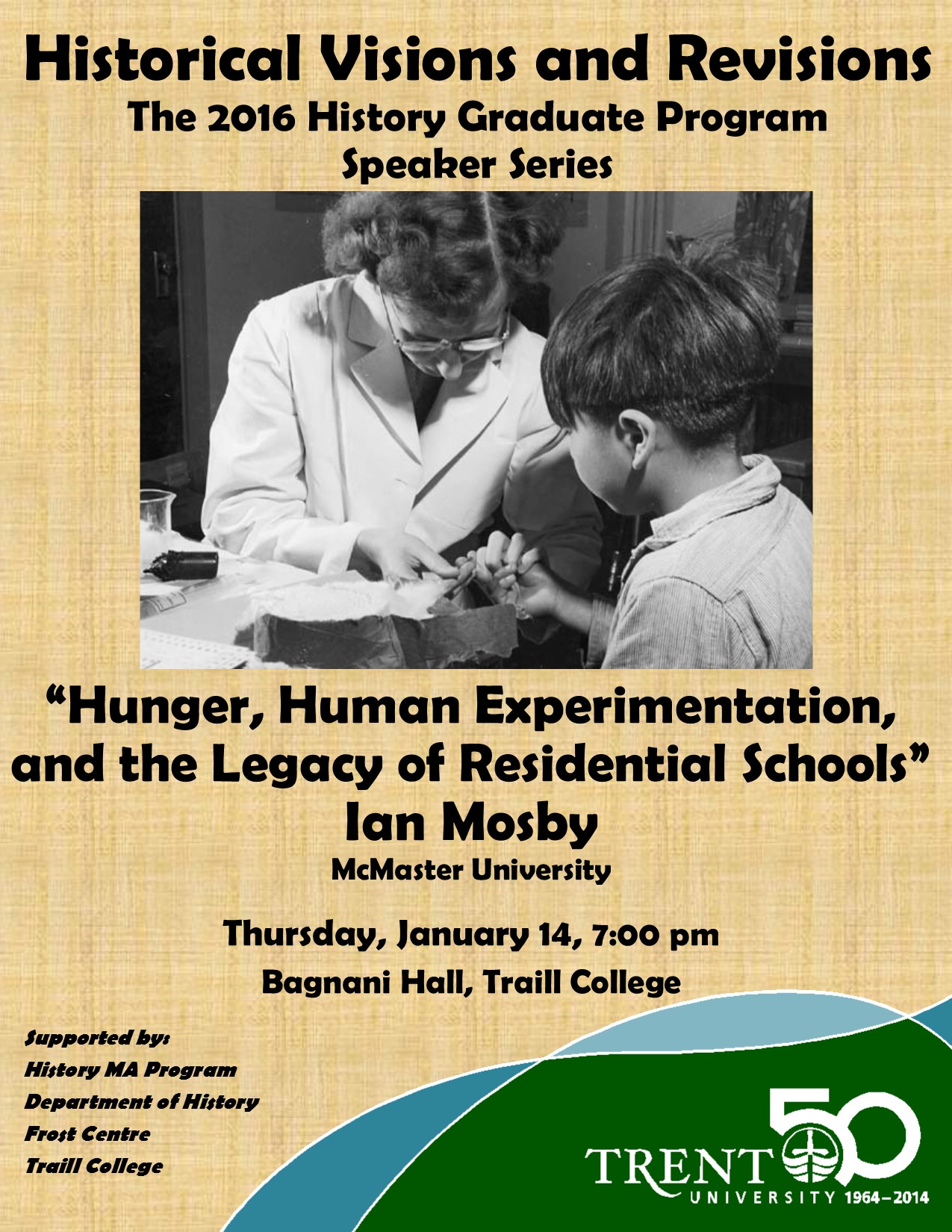 Dr. Ian Mosby
Dr. Ian Mosby
January 14, 2016
Hunger, Human Experimentation, and the Legacy of Residential Schools
Presented by the Historical Visions and Revisions Speakers Series
Dr. Ian Mosby’s talk will discuss his experience over the past year of meeting with and listening to the stories of survivors of a series of nutrition experiments conducted on nearly 1,000 children in Indian residential schools between 1948 and 1952. In July 2013, Dr. Mosby’s article Administering Colonial Science: Nutrition Research and Human Biomedical Experimentation in Aboriginal Communities and Residential Schools, 1942–1952, was published in the journal Histoire sociale/Social History and almost immediately received widespread coverage by Canadian as well as international media. Since that time, he has given dozens of talks about his research, including at multiple public forums for Mi’kmaq, Nuu-chah-nulth, Gitxsan and Anishinaabe survivors of these nutrition experiments.
The goal of Dr. Mosby’s talk will therefore be to provide some historical background for these experiments while also discussing what the broader response to his research tells us about Canada’s current efforts towards reconciliation – particularly following the end of the Truth and Reconciliation Commission’s mandate.
2014-15 Academic Year
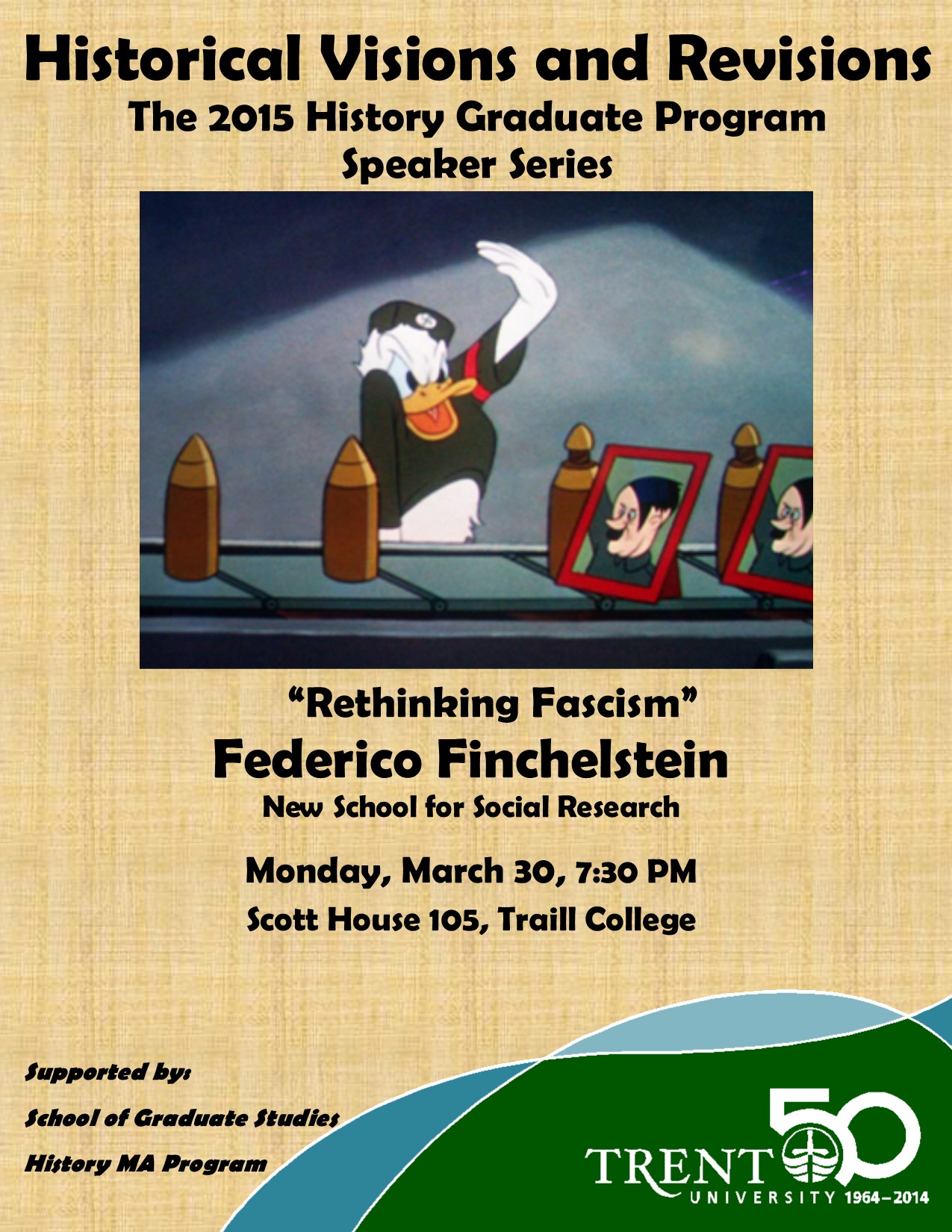 Dr. Federico Finchelstein
Dr. Federico Finchelstein
New School for Social Research in New York,
March 30, 2015
Rethinking Fascism
Presented by the Historical Visions and Revisions Speakers Series
Guest Speaker Professor Federico Finchelstein, from the New School for Social Research in New York, will be joining us to give a talk on rethinking fascism. The lecture will deal with the different interpretations of fascism in history, the central dimensions of fascism as explored in recent historiography: violence, ideology, empire and racism, through a trans-national approach.
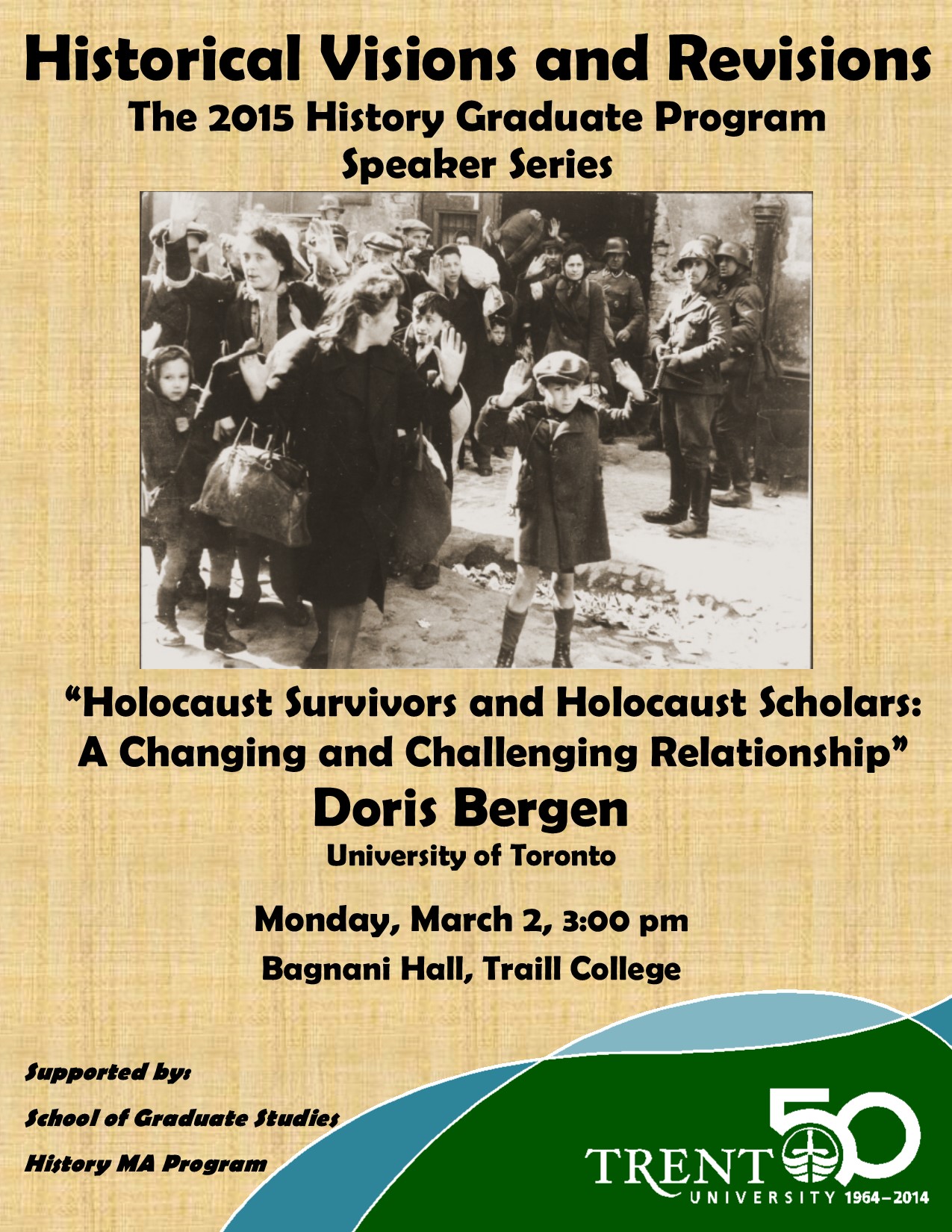 Dr. Doris Bergen
Dr. Doris Bergen
Professor, History at the University of Toronto
March 2, 2015
Holocaust Survivors and Holocaust Scholars: A Changing and Challenging Relationship
Presented by the Historical Visions and Revisions Speakers Series

